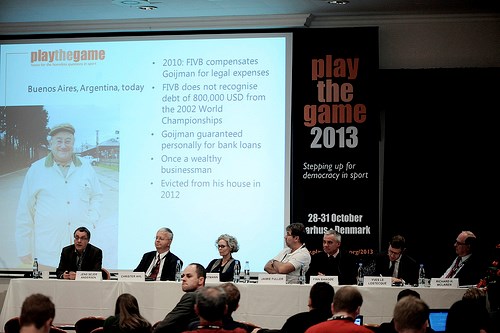Sports reform: How to change the tone at the top?

At Wednesday's final session, experts spoke on sports reform and the way forward. Photo: Play the Game / Thomas Søndergaard
31.10.2013
By Steve Menary“We need to convince politicians to finance investigation into sports governance and we also need to convince sports organisations to give something like whistle-blower protection programmes,” said Andersen, as he regaled the audience with the terrible fate of Mario Goijman, whose attempts to force reform of the Federation of International Volleyball (FIVB) has left the Argentinian broke and homeless.
“The IOC has had a few great results when trying to improve governance, like wrestling. In just four months there were great changes just with the hint that wrestling would not be in the Olympics. So why not in Volleyball when [former FIVB president Reuben] Acosta was allowed to plunder or FIFA with the ISL scandal?”
The call for help in financing investigative journalism into sports governance came during a session on Wednesday night, where a panel of leading figures in sports governance revealed the need for investigation and the limits placed on making change.
Jens Sejer Andersen began the proceedings by relaying the story of Goijman, whose attempt to oust despotic former FIVB president Acosta backfired, leaving the Argentine with a US $800,000 bill because he – not the FIVB – had provided financial guarantees for staging the World Championships in his homeland in 2002.
Andersen added: “Once he was a very wealthy businessman but he was evicted from his house on October 10 and his belongings were put up for compulsory sale. He must live on a pension of US $240 a month. He is suicidal and he cannot afford his medicine for diabetes. We have brought his case to the IOC and the Pan-American sports organisation but to no avail.
“There are not many soap operas on TV that are as entertaining in the way the Acosta’s managed the FIVB, but this has turned into a tragedy.”
After this sad tale, journalist and former International Handball Federation official Christer Ahl recounted another sorry tale of mismanagement and corruption at the IHF, which illustrated the difficulties in clubs trying to bring change from the grass roots.
Ahl said: “The clubs are stakeholders in the handball family but the president [Hassan Moustafa] simply dictates what the clubs get. If they say anything, they get nothing.”
Ahl suggested that democracy involving one vote for one country was an illusion and also indicated that serious threats from the IOC could be “effective” in terms of handball governance.
“Self-reporting can be hollow,” added Ahl. “External monitoring is needed and a clean-up is needed. Autonomy from political interference [that is insisted on by the IOC] can be hypocritical and prevent genuine monitoring.”
The positive role that sponsors can play in sports governance was illustrated by Jamie Fuller, the chairman of kit supplier Skins. Fuller was involved in setting up the Change Cycling Now lobby group, which was ultimately influential in recently helping to oust Pat McQuaid from the presidency of Union Cycliste International (UCI).
Fuller bemoaned the culture of fear that prevented both cyclists and sponsors in getting involved with Change Cycling now.
He said: “I couldn’t get anywhere with the cyclists or the sponsors. I spoke personally to 10 elite cyclists and they were all terrified. One wrote me a really eloquent letter saying what you are calling for is a revolution and in revolutions people die. If you can make a positive [drugs] test disappear, then you can make one appear too.”
Fuller was followed onto the podium in Aarhus by Finn Baagøe Hansen, a regional compliance officer from engineering giant Siemens, who recounted how the culture at his company had to be changed completely, including its own systems of governance. Hansen said: “You need to have management over your cash flow in order that the cash flow does not disappear.”
Siemens now employs 600 people on its in-house compliance programme and Hansen agreed with Jamie Fuller that sponsors had a voice that must be used. “As a company we should be able to influence stakeholders, NGOs and even governments to show there is a fairer way of doing business.”
That sports governance needed a combined effort from all stakeholders was evident from the final two speakers. Yves le Lostecque, the head of the European Union’s sports unit, insisted that his body was a “modest player.”
He added: “We are not in a position of imposing models of how to behave on sports organisations, but we are in a position to help. We have the political support of our member states.”
Finally, Richard H. McLaren, an arbitrator at the Court for Arbitration for Sport admitted that CAS was going to “have a very limited role in sports governance.”
He added: “You are not going to see CAS lead like you have in doping. It’s got to be up to the sport.”
That admission lead to Andersen’s plea for sports bodies to engage further in rooting out corruption and protecting whistle-blowers.





